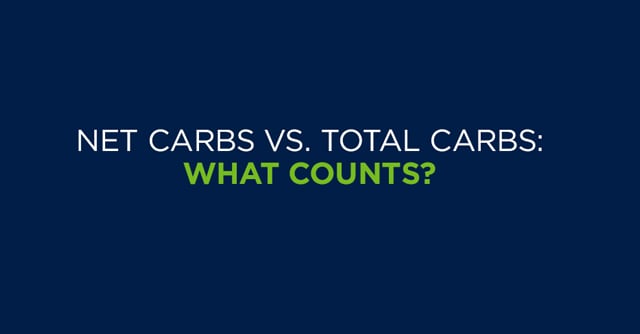Net carbs vs. total carbs: What counts?

People often wonder if they should count their net carbohydrates or total carbohydrates, which appear on some nutrition labels. Medtronic Diabetes Clinical Manager for Cape Cod, Massachusetts, Katie Crupi-Sullivan, RD, CDE, tackles net carbs, and the advice she gives her patients with diabetes.
Net carbs or total carbs: “I’m confused”
One of my patients recently asked me about a low carb bar her Mom had purchased for her to use as a quick snack. She wanted to know, “What is the deal with net carbs?” Net carbs was a phrase coined by the food industry when low carb diets became popular about a decade ago, and doesn’t have a formal definition. It’s not a term recognized by the Food and Drug Administration (FDA) or American Diabetes Association (ADA).
Net carbs usually subtract fiber, sugar alcohols, and glycerin from the total carbohydrates. This can be misleading for anyone counting carbs and using insulin to carb ratio to bolus for food.
When is it appropriate to subtract fiber or sugar alcohols from total carbs?
Looking at my patient’s pump download on CareLink, I realized when she ate the low carb bar, her blood sugar dropped. She asked, “What do I do to prevent these lows?” If you notice a low after eating high fiber foods (beans, whole grains, fiber fortified products or foods rich in sugar alcohols, sugar-free desserts and candies), there are rules set forth by the ADA:
- When a meal has more than five grams of total fiber, you can subtract half the total fiber from the total carbohydrate
- If a food contains sugar alcohols, you can subtract half the total sugar alcohol from the total carbohydrate
(Keep in mind that these are general guidelines and might vary for each individual so keep a close eye on your blood glucose.)
What’s the deal with sugar alcohols?
Sugar alcohols are used in many sugar-free items and small amounts occur naturally in plant foods. When reading food labels, look for erythritol, glycerol, isomalt, lactitol, maltitol, mannitol, sorbitol, xylitol, and hydrogenated starch hydrolysates.
Sugar alcohols are thought have a lower glycemic index and cause smaller spikes in blood sugar after meals. They have one half to one third less calories than sugar per gram, but remember, sugar alcohols are not “free” and you need to be cautious how much you’re consuming. In large quantities, sugar alcohols can cause gas, bloating, and diarrhea.
Why does fiber cause my blood sugars to drop?
Fiber is a type of carbohydrate. On a food label, fiber is included in the total carbohydrate and it isn’t fully digested by the body. Sometimes if you eat a meal or snack high in fiber, your blood glucose may drop because the fiber is not digested. It doesn’t turn into sugar or glucose in the body.
There are two types of fiber – soluble and insoluble. Soluble fiber dissolves in the water from your food, making a sticky liquid or gel. This gel helps trap certain food elements, slowing down digestion. Insoluble fiber adds bulk to the stool and can help food pass more quickly through the stomach and intestines.
According to the ADA, it’s recommended women eat about 25 grams and men eat about 38 grams of fiber per day. Slowly add in fiber by increasing fruits, vegetables, beans, nuts, seeds, whole grains and oats into your diet.
In the end…
Don’t get caught up in the latest diet trends! When managing your diabetes, keep in mind that total carbohydrate on a food label is the most important place to start.
Resources for carb counting
Calorie King; Free Apple App My Food Advisor
Guest Blogger – Katie Crupi-Sullivan, RD, CDE
Katie Crupi-Sullivan is a Registered Dietitian, Certified Diabetes Educator, and Medtronic Diabetes Clinical Manager for Cape Cod, Massachusetts. She dedicates her professional career to helping people with diabetes have a better understanding of how food affects diabetes control. She loves to educate people about advanced pump features and continuous glucose monitoring to improve diabetes management.



